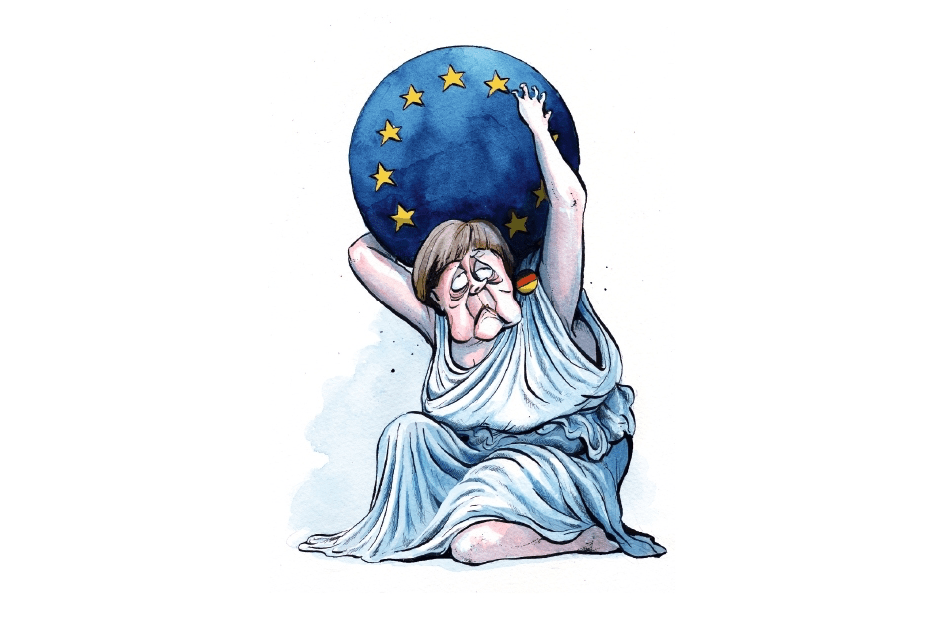When Angela Merkel leaves office after Bundestag elections next month, she will have forever changed the course of German history. Merkel has steered Germany through a recession, the Eurozone and migration crises and the Covid-19 pandemic. During the Trump presidency, Germany’s chancellor became an icon for liberals around the world. Yet her legacy in terms of Germany’s domestic politics leaves much to be desired. And her Christian Democratic Union (CDU) party has been left searching for meaning, with many voters now left wondering what the point of the Union is after Mutti.
On the face of it, Merkel’s insistence on reaching for consensus in German politics appears to be something to celebrate. Under her watch, Germany’s major parties have, generally speaking, principally agreed on the big political issues of the day, only diverging on timelines, what administrative measures should be taken and how much money ought to be thrown at the problem at hand. The vehicle for this quiet revolution at the heart of German politics was Merkel’s own party. In a decade or so, Merkel has shifted the CDU from the centre-right to the centre-left and infused with her essentially post-ideological understanding of government. But in doing so, she has left a gap in German politics.
To grasp the significance of this development, it is important to appreciate the role that the CDU traditionally played within the Federal Republic’s parliamentary system. Thirty years ago, when Merkel first entered the Bundestag after the country’s reunification as a relatively unknown, fresh-faced East German MP, the party stood for anti-Communism, civil liberties, law and order, Judeo-Christian values, European integration and a strong Bundeswehr embedded into Nato. These firm ideological convictions extended to opposing higher taxes, illegal migration, the minimum wage and gay marriage.
Merkel’s legacy has tipped this system of politics upside down
The Union had a clear liberal-conservative profile against which other parties formulated their own ideological positions. Germany’s Social Democrats (SPD) defined themselves as the voice of the country’s working men and women, immigrants and minorities; the Greens as the bad conscience of capitalism and saviours of world climate; the Free Democrats (FDP) as defenders of civil liberties and supporters of German businesses and the successor party of the Stalinist SED; Die Linke (The Left, formerly PDS), as the advocates of East German left-behinds and GDR nostalgics.
This was the party system that Merkel inherited when she became Chancellor in 2005. It still, by and large, resembled the old West-German parliamentary landscape in which political parties could clearly be distinguished from one another. Usually, the CDU would seek to form coalitions with the FDP, while the SPD struck partnerships with the Greens and, occasionally on the state-level, such as Berlin and Brandenburg, with Die Linke.
But Merkel’s legacy has tipped this system of politics upside down. Merkel, the East German without roots in West German conservativism, upended this carefully balanced constellation through a strategic three-step that was as much driven by pragmatism as it was by opinion polling: firstly, she took aim at the CDU’s sacred cows, including the shutdown of Germany’s nuclear plants after the Fukushima incident, the abolition of the draft, paving the way for gay marriage and her liberal migration policies.
In doing so, Merkel opened her party up to voters who had previously tended to vote for the SPD. Mutti’s so-called strategy of asymmetric demobilisation aimed to steer clear of ideological debates and transform political questions and crises into administrative challenges. Here, Merkel’s style of leading had much in common with the EU and its institutional structures, which favour late-night deliberations in conclaves and councils and top-down bureaucracy over grand parliamentary deliberations.
But there was a price to pay for this consensus politics. By moving the CDU to the left, Merkel turned the SPD into a junior coalition partner that has struggled to remain relevant ever since 2005. This has had disastrous consequences for the public image and self-understanding of the once proud Social Democrats. When recently asked in an interview what he would do differently than Merkel, the SPD’s candidate for chancellor and current minister of finance, Olaf Scholz was left lost for words. This showed all too clearly how much his party’s identity has been hollowed out in the Great Coalition, where it has effectively governed itself into a position of insignificance.
Merkel’s own successor as CDU chairman, Armin Laschet has also suffered in opinion polls, as German voters appear to struggle to understand what the party now stands for. The Greens have been able to profit from this conservative lethargy by shifting to the centre and targeting middle class voters. But they are one of the few outfits in German politics to end up in a stronger position now than when Merkel took power.
This is Merkel’s legacy. And it is clear that Mutti’s uprooting of German politics has also left the CDU’s right flank vulnerable to challenges by the AfD, whose ranks swelled with disgruntled conservatives, disappointed by the Chancellor’s migration and eurozone policies. Yet while the party channels populist frustrations, the AfD – like Die Linke – is in no position to influence national policies.
Merkel’s style of government now means that almost every party in the Bundestag can form coalitions with every other. This is the new party system that the Chancellor leaves to her successor. Unless the CDU moves back to the right and rediscover its liberal-conservative roots, Merkelism looks here to stay – and it is not clear that is a good thing for German politics.






Comments